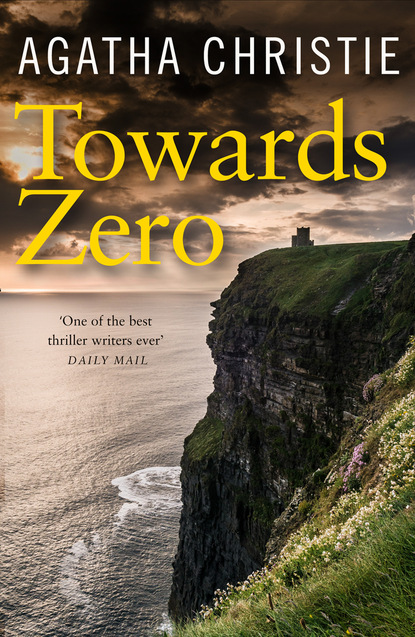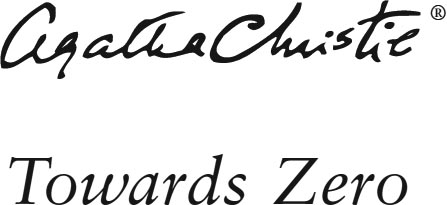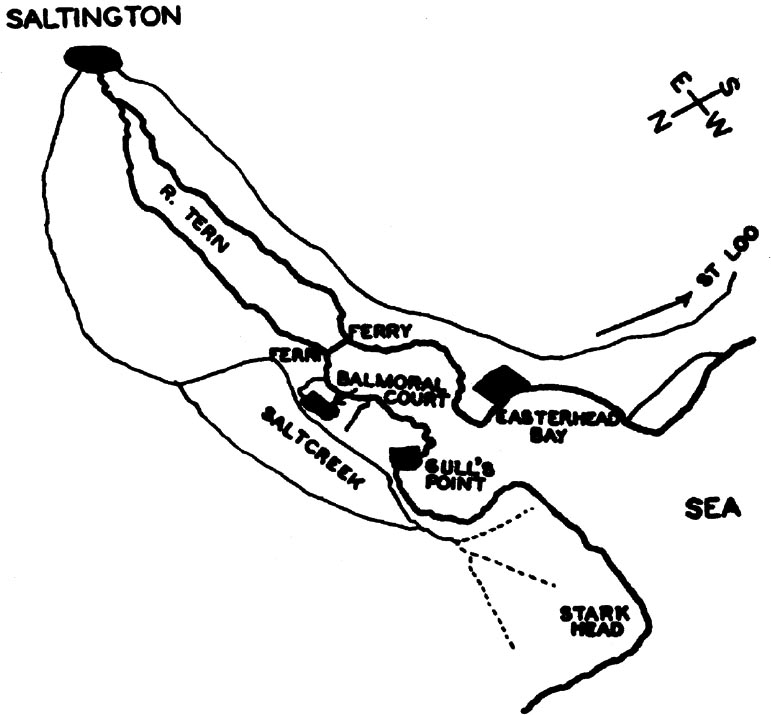
Полная версия:
Towards Zero



Copyright
Published by HarperCollinsPublishers Ltd
1 London Bridge Street
London SE1 9GF
www.harpercollins.co.uk
First published in Great Britain by Collins, The Crime Club 1944
Towards Zero™ is a trade mark of Agatha Christie Limited and Agatha Christie® and the Agatha Christie Signature are registered trade marks of Agatha Christie Limited in the UK and elsewhere.
Copyright © 1944 Agatha Christie Limited. All rights reserved.
www.agathachristie.com
Cover by designedbydavid.co.uk © HarperCollins/Agatha Christie Ltd 2017
Agatha Christie asserts the moral right to be identified as the author of this work.
A catalogue copy of this book is available from the British Library.
This novel is entirely a work of fiction. The names, characters and incidents portrayed in it are the work of the author’s imagination. Any resemblance to actual persons, living or dead, events or localities is entirely coincidental.
All rights reserved under International and Pan-American Copyright Conventions. By payment of the required fees, you have been granted the non-exclusive, non-transferable right to access and read the text of this e-book on screen. No part of this text may be reproduced, transmitted, down-loaded, decompiled, reverse engineered, or stored in or introduced into any information storage and retrieval system, in any form or by any means, whether electronic or mechanical, now known or hereinafter invented, without the express written permission of HarperCollins.
Source ISBN: 9780008196318
Ebook Edition © February 2017 ISBN: 9780007422890
Version: 2017-04-17
Dedication
To Robert Graves
Dear Robert,
Since you are kind enough to say you like my stories, I venture to dedicate this book to you. All I ask is that you should sternly restrain your critical faculties (doubtless sharpened by your recent excesses in that line!) when reading it.
This is a story for your pleasure and not a candidate for Mr Graves’ literary pillory!
Your friend,

Contents
Cover
Title Page
Copyright
Dedication
Map
Prologue: November 19th
‘Open the Door and Here are the People’
Snow White and Red Rose
A Fine Italian Hand …
Zero Hour
Also by Agatha Christie
About the Publisher
Map

Prologue
November 19th
The group round the fireplace was nearly all composed of lawyers or those who had an interest in the law. There was Martindale the solicitor, Rufus Lord, KC, young Daniels who had made a name for himself in the Carstairs case, a sprinkling of other barristers, Mr Justice Cleaver, Lewis of Lewis and Trench and old Mr Treves. Mr Treves was close on eighty, a very ripe and experienced eighty. He was a member of a famous firm of solicitors, and the most famous member of that firm. He had settled innumerable delicate cases out of court, he was said to know more of backstairs history than any man in England and he was a specialist on criminology.
Unthinking people said Mr Treves ought to write his memoirs. Mr Treves knew better. He knew that he knew too much.
Though he had long retired from active practice, there was no man in England whose opinion was so respected by the members of his own fraternity. Whenever his thin precise little voice was raised there was always a respectful silence.
The conversation now was on the subject of a much talked of case which had finished that day at the Old Bailey. It was a murder case and the prisoner had been acquitted. The present company was busy trying the case over again and making technical criticisms.
The prosecution had made a mistake in relying on one of its witnesses—old Depleach ought to have realized what an opening he was giving to the defence. Young Arthur had made the most of that servant girl’s evidence. Bentmore, in his summing up, had very rightly put the matter in its correct perspective, but the mischief was done by then—the jury had believed the girl. Juries were funny—you never knew what they’d swallow and what they wouldn’t. But let them once get a thing into their heads and no one was ever going to get it out again. They believed that the girl was speaking the truth about the crowbar and that was that. The medical evidence had been a bit above their heads. All those long terms and scientific jargon—damned bad witnesses, these scientific johnnies—always hemmed and hawed and couldn’t say yes or no to a plain question—always ‘in certain circumstances that might take place’—and so on!
They talked themselves out, little by little, and as the remarks became more spasmodic and disjointed, a general feeling grew of something lacking. One head after another turned in the direction of Mr Treves. For Mr Treves had as yet contributed nothing to the discussion. Gradually it became apparent that the company was waiting for a final word from its most respected colleague.
Mr Treves, leaning back in his chair, was absent-mindedly polishing his glasses. Something in the silence made him look up sharply.
‘Eh?’ he said. ‘What was that? You asked me something?’
Young Lewis spoke.
‘We were talking, sir, about the Lamorne case.’
He paused expectantly.
‘Yes, yes,’ said Mr Treves. ‘I was thinking of that.’
There was a respectful hush.
‘But I’m afraid,’ said Mr Treves, still polishing, ‘that I was being fanciful. Yes, fanciful. Result of getting on in years, I suppose. At my age one can claim the privilege of being fanciful, if one likes.’
‘Yes, indeed, sir,’ said young Lewis, but he looked puzzled.
‘I was thinking,’ said Mr Treves, ‘not so much of the various points of law raised—though they were interesting—very interesting—if the verdict had gone the other way there would have been good grounds for appeal, I rather think—but I won’t go into that now. I was thinking, as I say, not of the points of law but of the—well, of the people in the case.’
Everybody looked rather astonished. They had considered the people in the case only as regarding their credibility or otherwise as witnesses. No one had even hazarded a speculation as to whether the prisoner had been guilty or as innocent as the court had pronounced him to be.
‘Human beings, you know,’ said Mr Treves thoughtfully. ‘Human beings. All kinds and sorts and sizes and shapes of ’em. Some with brains and a good many more without. They’d come from all over the place, Lancashire, Scotland—that restaurant proprietor from Italy and that school teacher woman from somewhere out Middle West. All caught up and enmeshed in the thing and finally all brought together in a court of law in London on a grey November day. Each one contributing his little part. The whole thing culminating in a trial for murder.’
He paused and gently beat a delicate tattoo on his knee.
‘I like a good detective story,’ he said. ‘But, you know, they begin in the wrong place! They begin with the murder. But the murder is the end. The story begins long before that—years before sometimes—with all the causes and events that bring certain people to a certain place at a certain time on a certain day. Take that little maid servant’s evidence—if the kitchenmaid hadn’t pinched her young man she wouldn’t have thrown up her situation in a huff and gone to the Lamornes and been the principal witness for the defence. That Guiseppe Antonelli—coming over to exchange with his brother for a month. The brother is as blind as a bat. He wouldn’t have seen what Guiseppe’s sharp eyes saw. If the constable hadn’t been sweet on the cook at No 48, he wouldn’t have been late on his beat …’
He nodded his head gently:
‘All converging towards a given spot … And then, when the time comes—over the top! Zero Hour. Yes, all of them converging towards zero …’
He repeated: ‘Towards zero …’
Then gave a quick little shudder.
‘You’re cold, sir, come nearer the fire.’
‘No, no,’ said Mr Treves. ‘Just someone walking over my grave, as they say. Well, well, I must be making my way homewards.’
He gave an affable little nod and went slowly and precisely out of the room.
There was a moment of dubious silence and then Rufus Lord, KC, remarked that poor old Treves was getting on.
Sir William Cleaver said:
‘An acute brain—a very acute brain—but Anno Domini tells in the end.’
‘Got a groggy heart, too,’ said Lord. ‘May drop down any minute, I believe.’
‘He takes pretty good care of himself,’ said young Lewis.
At that moment Mr Treves was carefully stepping into his smooth-running Daimler. It deposited him at a house in a quiet square. A solicitous butler valet helped him off with his coat. Mr Treves walked into his library where a coal fire was burning. His bedroom lay beyond, for out of consideration for his heart he never went upstairs.
He sat down in front of the fire and drew his letters towards him.
His mind was still dwelling on the fancy he had outlined at the Club.
‘Even now,’ thought Mr Treves to himself, ‘some drama—some murder to be—is in course of preparation. If I were writing one of these amusing stories of blood and crime, I should begin now with an elderly gentleman sitting in front of the fire opening his letters—going, unbeknownst to himself—towards zero …’
He slit open an envelope and gazed down absently at the sheet he abstracted from it.
Suddenly his expression changed. He came back from romance to reality.
‘Dear me,’ said Mr Treves. ‘How extremely annoying! Really, how very vexing. After all these years! This will alter all my plans.’
Конец ознакомительного фрагмента.
Текст предоставлен ООО «ЛитРес».
Прочитайте эту книгу целиком, купив полную легальную версию на ЛитРес.
Безопасно оплатить книгу можно банковской картой Visa, MasterCard, Maestro, со счета мобильного телефона, с платежного терминала, в салоне МТС или Связной, через PayPal, WebMoney, Яндекс.Деньги, QIWI Кошелек, бонусными картами или другим удобным Вам способом.
Вы ознакомились с фрагментом книги.
Для бесплатного чтения открыта только часть текста.
Приобретайте полный текст книги у нашего партнера:
Полная версия книги
Всего 10 форматов

